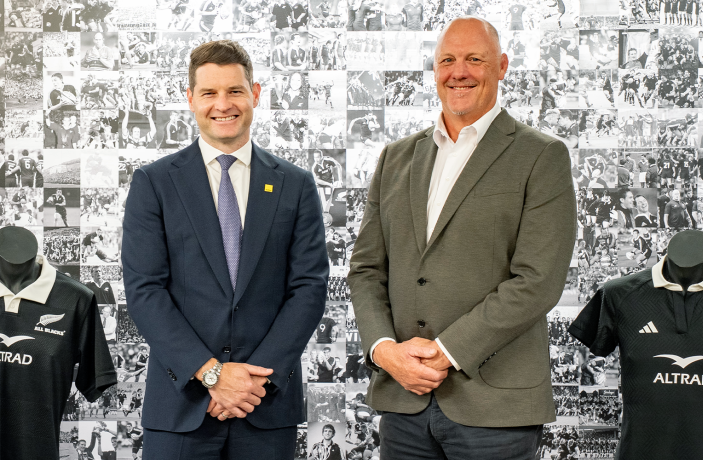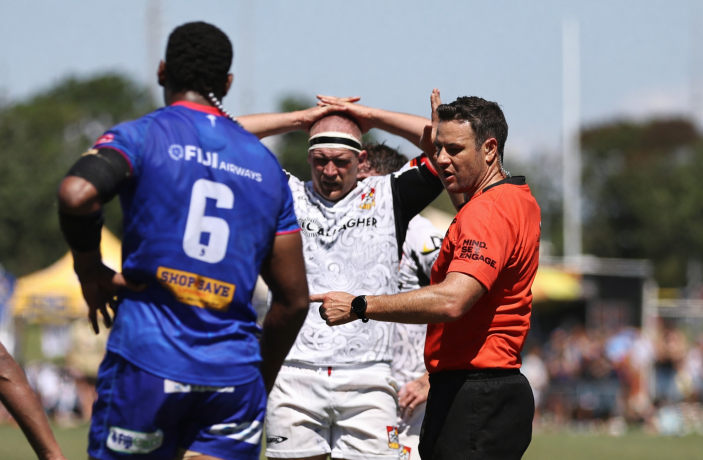HeadFirst wellbeing series: episode one
24 April 2020Nehe Milner-Skudder, Ruby Tui and Du’Plessis Kirifi are encouraging New Zealanders to prioritise their mental fitness during the country’s lockdown by creating a plan and sticking to it.
In association with HeadFirst, New Zealand Rugby’s mental health and wellbeing programme, the trio are featuring in a series of live webinars and in Episode 1 (which you can view below) Milner-Skudder encourages young people to prioritise their mental fitness.
“[If I could go back] I would have started looking into mental fitness and how it impacts performance a lot earlier,” he said. “I didn’t really start taking it seriously and understanding it until I was at Super [Rugby] and All Blacks level. Being part of it and seeing how those other world class players operated, the penny dropped.”
The result was Milner-Skudder began take his mental wellbeing as seriously as his rugby training.
“Having a routine is key. When it comes to rugby specific stuff I will plan it out, gym in the morning, analysis, lunch, our whole day is scheduled, so there is no reason you can’t schedule in those mental [fitness] hits you can get through the day.”
For the 2015 Rugby World Cup winning All Black that includes scheduling exercise, chats with friends and family, and writing things down in a journal to get an understanding of the “go-tos” which keep him in a positive frame of mind.
“For me that’s doing something physical, getting out for a walk or doing exercise. Times when I’ve been feeling down, I’ve discovered that shifting my physical state helps me get away from [negative] things I might be thinking about.
“At the same time, I want to be in tune with my thoughts. It might be getting out the book, whether it’s a journal or just writing a few things down… ‘if these [negative] things happen again, this is how I’ll act’, or, ‘these things made me feel good so I’ll keep that on and keep those things up’.”
Black Ferns Sevens star Tui, an Olympic Sevens medallist and 2018 Sevens Rugby World Cup winner, has also prioritised her wellbeing.
“I love the term mental fitness. For some people, for some reason, mental health can have negative connotations, or people are scared of it. For me mental fitness is spot on because you do have to work on it just like physical fitness.”
Tui said it was important to remember that looking after our mental fitness was essential for everyone with both men and women represented in mental health statistics.
“I’m really proud of Nehe and Dupes for coming on and talking about it because blokes can get really effected according to the stats. One in six men will experience depression, with one in four women associating with depression throughout their lives too, so its’ important that the wahine are on top of it as well.”
Her mental fitness routine includes a strict focus on her sleep patterns and diet and plenty of ‘me time’.
“People talk about big moments, big rugby games, or physical successes and they talk about the top two inches. I agree with that… how can I be in my best state if my brain isn’t functioning properly?”
Tui encouraged people to use the country’s lock down to get to know themselves.
“I’m a huge believer in ‘me time’. Whether it’s going to the beach, getting into nature, having a coffee, going to a cafe on my own and being content with who I am. I heard it when I was young, if you can’t enjoy your own company, how can anybody else. Being ok with who you are.”
Like Milner-Skudder, Tui said her mental fitness had a positive influence on the field.
“The reason players are dropping the ball or missing the tackle usually isn’t about the rugby, it’s their mental state. It’s recognising when you are in the red [frustrated/distracted], or when you are in the green [calm/focused], is important. It’s about self-awareness, but also so you can be a better teammate.”
Kirifi, in his second year of Investec Super Rugby with the Hurricanes, said the connection between mental fitness and on-field performance was undeniable.
“It’s huge. If anyone tells you it’s not, they are lying. We play rugby, or deal with any high-pressure situation as much with our body as our minds. The more time you spend learning to cope with high pressure situations in your mind the better you will fare.”
Kirifi, in his second year of Investec Super Rugby with the Hurricanes, said he had scoffed at the value of mental fitness as a young school leaver, but quickly realised the pressure of professional sport needed to be managed.
“You are constantly dealing with things not in the game. It might be a situation in your personal life, you aren’t getting selected, your injured, or your dealing with a coach who doesn’t favour you. There are a lot of things that factor into it.
“The better prepared you are, the better tools you have to deal with those things the more you are able to perform in a positive way. If you don’t then you will crumble. Your mind is your biggest tool, no doubt.”
His routine included making his meals the night before, reading his coaches notes early in the week and getting rid of as much mental baggage as possible before game day.
“When it’s going really well it looks like I have everything in place. I like to pack my dinner for the next day the night before, so I’m set. Heading to a game, I’ve read my notes at the start of the week, so they aren’t stressing me out at the end.
“Little admin jobs I don’t let them pile up until Friday. Little things, keeping on top so the pressure doesn’t build up cos at the end of the day it has to go somewhere. So, it’s relieving the pressure along the way not letting it come to a point.”
He encouraged young players not to be scared of acknowledging they are struggling.
“You find it easy when things aren’t going well to hide away or surround yourself with people to make you feel better in the moment. The harder thing is to lean into that discomfort and ask yourself why your feeling down and try to figure out what’s at the core of it.
“When things aren’t going well, I take the opportunity to lean in and figure out more why I feel that way… talking to people who I trust. It’s not easy. Some of the conversations are hard, but I find it beneficial in the long term.”



